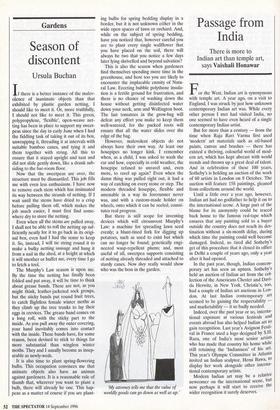Gardens
Season of discontent
Ursula Buchan
there is a better instance of the malev- olence of inanimate objects than that exhibited by plastic garden netting, I should like to meet it. Or, more truthfully, I should not like to meet it. This green, polypropylene, `flexible', open-weave net- ting has been in place to support my sweet- peas since the day in early June when I had the fiddling task of taking it out of its box, unwrapping it, threading it at intervals with suitable bamboo canes, and tying it and them together with string. All this to ensure that it stayed upright and taut and did not slide gently down, like a drunk sub- siding to the bar-room floor.
Now that the sweetpeas are over, the structure must be dismantled. This job fills me with even less enthusiasm. I have now to remove each stem which has insinuated its way between the strands of netting. If I wait until the stems have dried to a crisp before pulling them off, which makes the job much easier, I must first find some- where dry to store the netting.
Even when all the stems are pulled away, I shall not be able to roll the netting up suf- ficiently neatly for it to go back in its origi- nal box, even had I had the sense to keep it. So, instead, I will tie string round it to make a bulky netting sausage and hang it from a nail in the shed, at a height at which it will smother or buffet me, every time I go to fetch a tool.
The Murphy's Law season is upon me. By the time the netting has finally been folded and put away, it will be time to think about grease bands. These are not, as you might think, leather-jacketed rock groups, but the sticky bands put round fruit trees, to catch flightless female winter moths as they climb up the tree trunks to lay their eggs in crevices. The grease band comes on a long roll, with the sticky part to the inside. As you pull away the outer covering, your hand inevitably comes into contact with the inside. These bands have, for some reason, been devised to stick to things far more substantial than wingless winter moths. They and I usually become as insep- arable as newly-weds.
It is also time to plant spring-flowering bulbs. This occupation convinces me that animate objects also have an animus against gardeners. It is a reasonable rule of thumb that, wherever you want to plant a bulb, there will already be one. This hap- pens as a matter of course if you are plant-
ing bulbs for spring bedding display in a border, but it is not unknown either in the wide open spaces of lawn or orchard. And, while on the subject of spring bedding, have you noticed that, however careful you are to plant every single wallflower that you have placed on the soil, there will always be two that you notice a few days later lying shrivelled and beyond salvation?
This is also the season when gardeners find themselves spending more time in the greenhouse, and here too you are likely to encounter the implacable enmity of Natu- ral Law. Erecting bubble polythene insula- tion is a fertile ground for frustration, and there is no chance of washing down the house without getting disinfected water down your neck, arm and Wellington boot. The last tomatoes in the grow-bag will defeat any effort you make to keep them well-watered, for the packed roots will ensure that all the water slides over the edge of the bag.
However, malevolent objects do not always have their own way. At least our hosepipes no longer kink. I remember when, as a child, I was asked to wash the car and how, especially in cold weather, the hosepipe refused to unravel and, even more, to ravel up again? Even when the damn thing was pulled right out, it had a way of catching on every stone or step. The modern threaded hosepipe, flexible and amenable in a way its forerunner never was, and with a custom-made holder on wheels, onto which it can be reeled, consti- tutes real progress.
But there is still scope for inventing devices which will circumvent Murphy's Law: a machine for spreading lawn seed evenly; a blunt-tined fork for digging up potatoes, such as used to exist but which can no longer be found; genetically engi- neered wasp-repellent plums; and, most useful of all, sweetpea supports consisting of netting already threaded and attached to sturdy canes. Now they really would show who was the boss in the garden.
My attorney tells me that the value of worldly goods can go down as well as up.'


































































 Previous page
Previous page